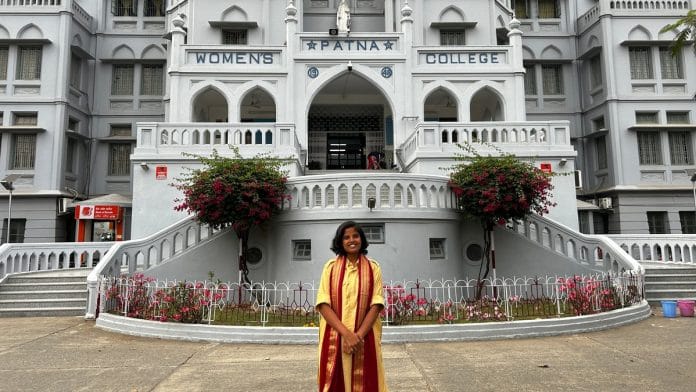Patna: The office of Patna University’s Student Union on Ashok Rajpath buzzes with a sense of renewal. The gates slowly open, staffers mop the floor, and portraits on the walls are carefully dusted. In the hall, the middle chair on a dais is being polished to perfection.
It’s the president’s chair for the oath-taking ceremony. No one quite remembers who first sat on it, only that it was definitely a man. And for about seven decades, it stayed that way. That changed on 8 April.
For the first time, the chair seated a woman—third-year political science student Maithily Mrinalini of the Akhil Bharatiya Vidyarthi Parishad (ABVP). She shattered expectations and defeated her closest rival, Manoranjan Kumar Raja of the National Students’ Union of India (NSUI), by a margin of 603 votes.
But the story doesn’t end there. For the first time in the history of the Patna University Students’ Union (PUSU), all three top posts are now held by women. Independent candidate Saloni Raj is general secretary. NSUI’s Soumya Srivastava, a postgraduate student, took the treasurer’s seat.
Their wins came after an intense 10-day election campaign. Eight contenders fought for the president’s post, including from the BJP-backed ABVP, the Congress’ NSUI, and independent candidates.
“Science students have laboratories to experiment, but arts students find their laboratory in the streets and the society around them,” said 20-year-old Mrinalini, wearing a yellow Pathan suit and sporting a short haircut. Days after her victory, in which she polled 3,524 votes, she toured Patna Women’s College, shaking hands and hugging those who had voted for her.
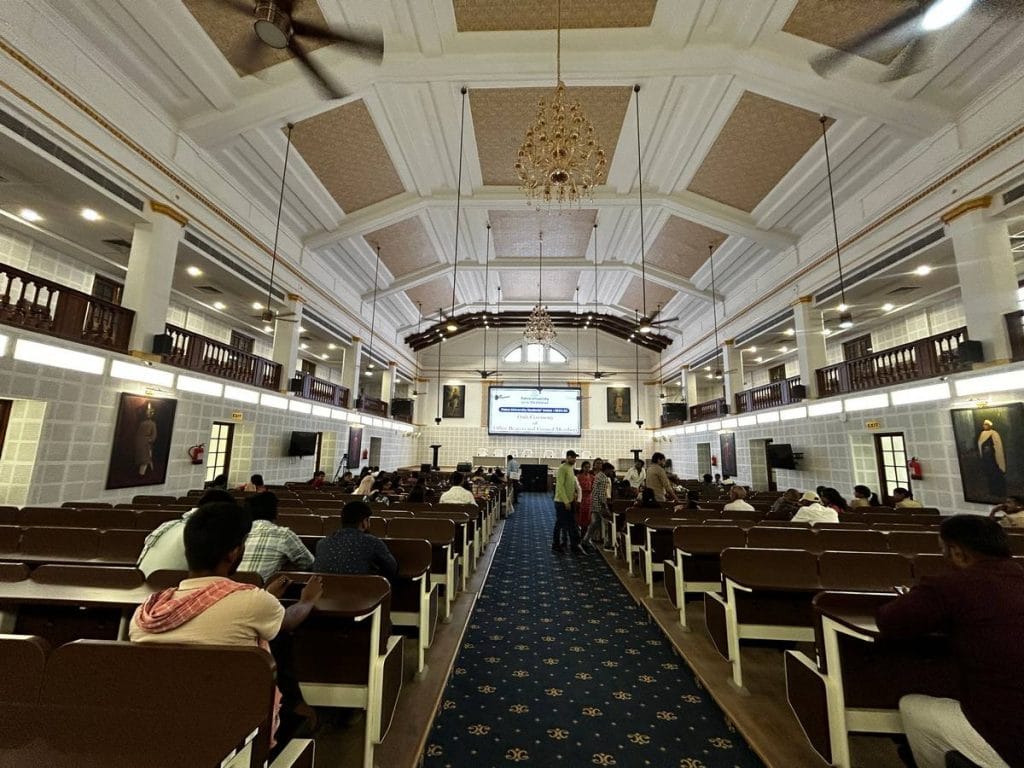
For decades, student politics at Patna University was a boys’ club, run on muscle, money power, and party support. It produced leaders like Lalu Prasad Yadav, Ravi Shankar Prasad, and Sushil Kumar Modi. Firebrand politics and goondagardi often went hand in hand.
“These results feel like a positive shift—a break from the dominance of masculine politics,” said Professor Shefali Roy, the director of Public Administration and former head of the Department of Political Science at Patna University. “For the longest time, female students had perceived campus politics as men’s business, often associated with goondagardi (hooliganism).”
If I can fulfil even one of my many promises, it would be to revive the legacy of great poets and politicians, like Ramdhari Singh Dinkar and JP Narayan
-Maithily Mirinalini, PUSU president
But the women didn’t overturn the format entirely. They rode in black SUVs, waved from sunroofs, handed out parchis, wore marigold garlands, and campaigned in sneakers, just like the men. The scenes could have come straight from Anurag Kashyap’s Gulaal, except this time, the leads were women.
Saloni Raj, in fact, said she was tired of being asked about “women winning” all the time. “Ask me other questions,” she told ThePrint. These candidates didn’t just run as women but to win. And the response they got suggests campus politics itself is changing fundamentally.
Even though the campaigning is over, its effects are still playing out. Instagram is buzzing with reels set to Dabdaba Hai and Aisi Dhakad Hai, featuring Mrinalini and Raj, who both used social media smartly to connect with students and spread their message.
“The three winning women candidates didn’t limit their campaigns or promises to women’s issues alone,” said Roy. “Their speeches were inclusive, and the boys reposed their trust in women’s leadership. That, in itself, is a remarkable beginning.”
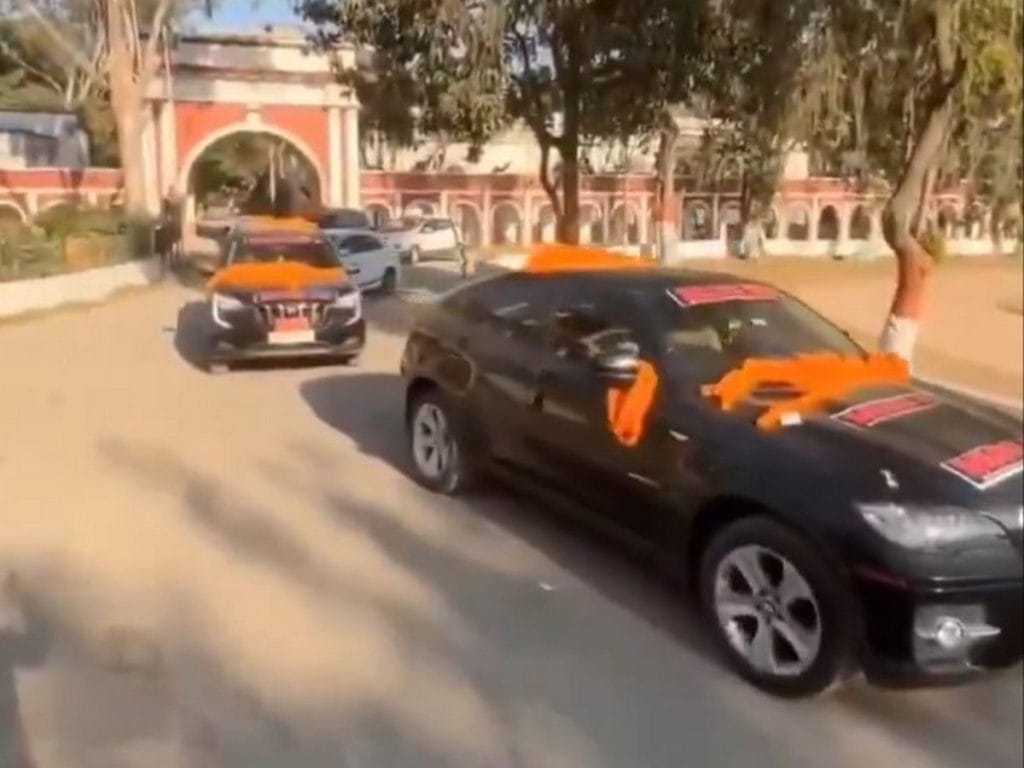
Also Read: Delhi student politics is changing. New DUSU president’s use of fear and force has many fans
From Munger to the mic
On the eve of the election, 27 March, Maithily Mrinalini strode onto the stage at PU’s Science College for the presidential debate, a long-standing tradition modelled on Oxbridge.
With a booming voice and a forceful manner, equally at ease in Hindi and English, she spoke not just about campus politics but national issues too. At one point, she broke into a rousing slogan: “Tum jaativaad se todoge, hum rashtravaad se jodenge” (You will break with casteism, we will unite with nationalism).
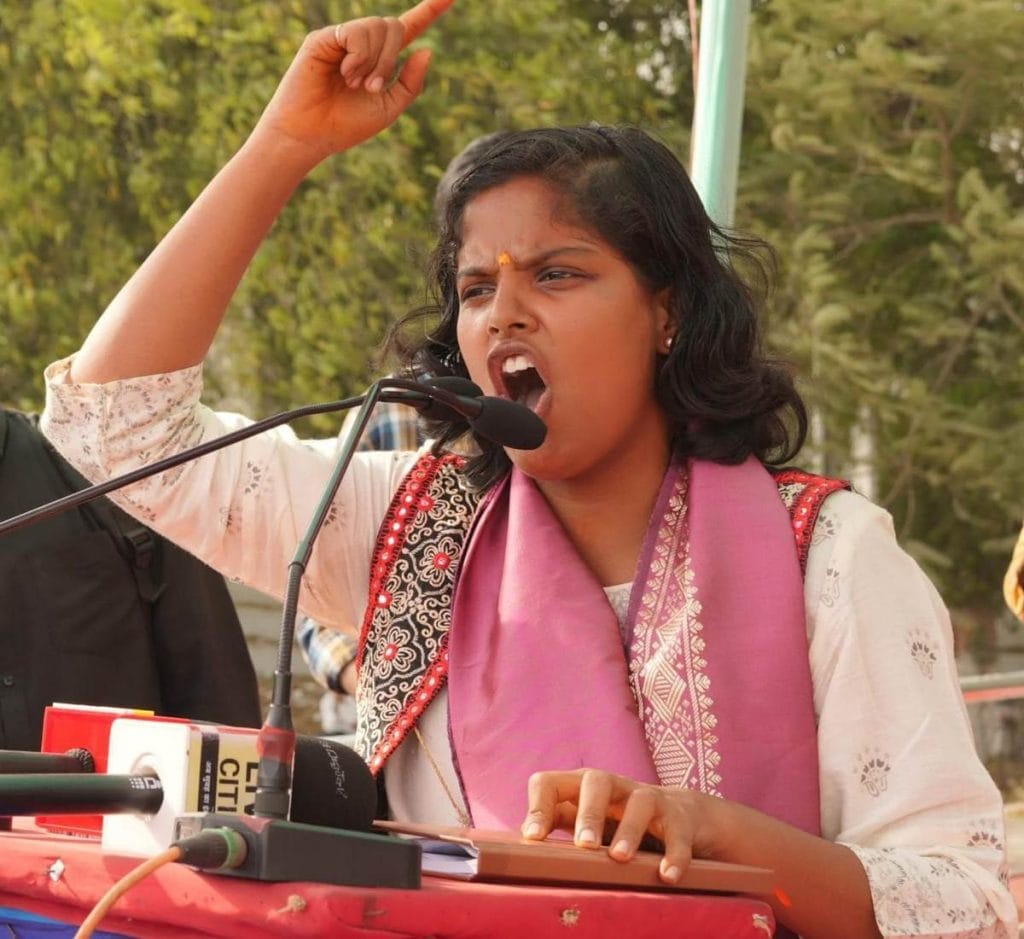
In the cheering crowd sat her proud mother, Niti Pathak, 48, an alumna of Patna University’s Mahila Magadh College.
Pathak said she was reminded of something she had done years ago, when Mrinalini was still in Class 4 in Munger, a small town known largely for Naxalism and illegal gun manufacturing. She had secretly filled out an entrance form for Notre Dame Academy, one of Munger’s most prestigious schools.
“I didn’t tell anyone in the family,” Pathak told ThePrint. “I made her sit for the entrance exam and only informed her father after she cleared it.” In doing so, she defied the norms of southern Bihar, where girls’ education was often treated as optional.
A bright student, Maithily was never afraid of using her voice. She studied at Notre Dame Academy till Class 10, then completed her schooling at Banasthali Vidyapeeth in Rajasthan, where she was a gold medallist. In 2022, she returned to Bihar and enrolled at Patna Women’s College. That same year, she contested her first student election as a councillor. In 2023, she joined the National Cadet Corps, represented Bihar-Jharkhand at the Republic Day parade, and bagged All India Rank 3 in the NCC merit list.
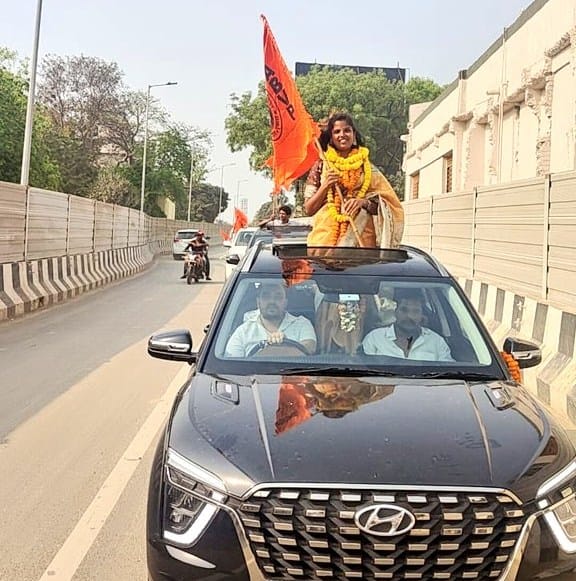
“My parents never limited my abilities to my gender,” she said. She ran on the planks of improving “pravesh (admissions), pariksha (exams), pathyakram (syllabus), parisar (campus), and parinam (result)” and wants to set up sanitary napkin vending machines on campus. She hopes to eventually do a PhD and become a professor.
Her mother, too, puts a premium on academics.
Pathak grew up in a household where education was valued. Her grandfather, a retired research officer from the State Council of Educational Research and Training, Bihar, ensured she had opportunities that many girls were denied at the time.
“The treatment often given to daughters in southern Bihar was in stark contrast to my reality. This is my observation, having witnessed the city life and the rural life,” Pathak said. “Girls have to go the extra mile to get even the basics.”
The three winning women candidates didn’t limit their campaigns or promises to women’s issues alone. Their speeches were inclusive, and the boys reposed their trust in women’s leadership
-Prof Shefali Roy, director of Public Administration at Patna University.
Back in the 90s, most of the 60-odd girls in her hostel were married off sooner or later. She herself married a middle school teacher, Neeraj Kumar Pathak, and has been in and out of the workforce since.
“But from the beginning, I wanted her to have every opportunity I once had as a city girl. So, I enrolled her in a taekwondo class in Munger,” she said. Despite taunts from neighbours and relatives, the mother-daughter duo travelled eight kilometres daily for the class. Out of nine girls in that batch, it was Mrinalini’s name that made it to a local daily when she won a bronze medal in a state-level taekwondo competition.
“Papa ki beti, dadi ki poti,” the article read.
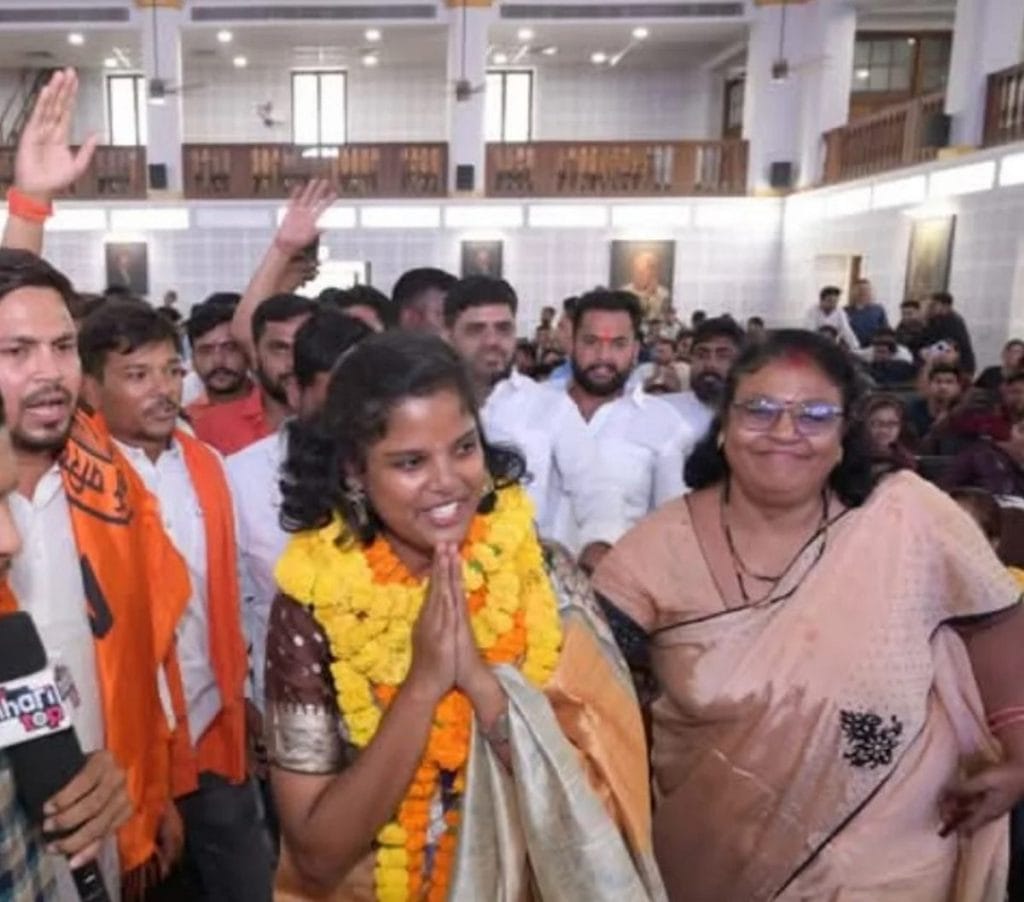
Pathak was in a hundreds-strong crowd again on 8 April, watching her daughter take the oath at Wheeler Senate Hall (now called Jayaprakash Narayan Anushad Bhawan). The sari-clad Mrinalini was solemn during the ceremony. But before that, she circled the campus, wielding a saffron ABVP flag through the sunroof of an SUV, with a convoy of bikes flanking the vehicle. A mostly male procession shouted zindabad as they escorted her to the podium.
But before the triumph, the election saw a few moments of ignominy.
A legacy lost but not forgotten
A few days before the results, independent candidate Saloni Raj posted a video that went viral. She’s in tears at first, staring at torn campaign materials scattered on grass. Then she looks straight at the camera and speaks with unbridled fury.
“Tum log sabko mirchi lag rahi hai na (You’re all feeling the burn, right)? she says. “Whoever did this, come shoot me in the face…shoot me in the chest. It’s an open challenge. This time a girl will win!”
Visionary leadership awaits!
Saloni Raj is poised to make a difference.
Patna University, let's stand by her side.#PatnaUniversityStandsWithSaloni. pic.twitter.com/lOZrAOr4kd
— Ram Singh (@SinghRam61402) March 26, 2025
The video came just after a series of campaign clashes, including a shooting incident outside Patna Women’s College. Raj’s fury and her anti-goondagardi plank struck a chord.
Only a year ago, Harsh Raj, a 22-year-old undergraduate from BN College, was lynched with iron rods and hockey sticks by around ten men on the law college campus. He had planned to contest the PUSU elections. The killing—allegedly over political rivalry—led to exams being postponed and student protests across the city.
PUSU elections have always been high stakes. They’ve launched politicians who went on to become state leaders, chief ministers, and union ministers. But they’ve also been marred by long suspensions and violent turns.
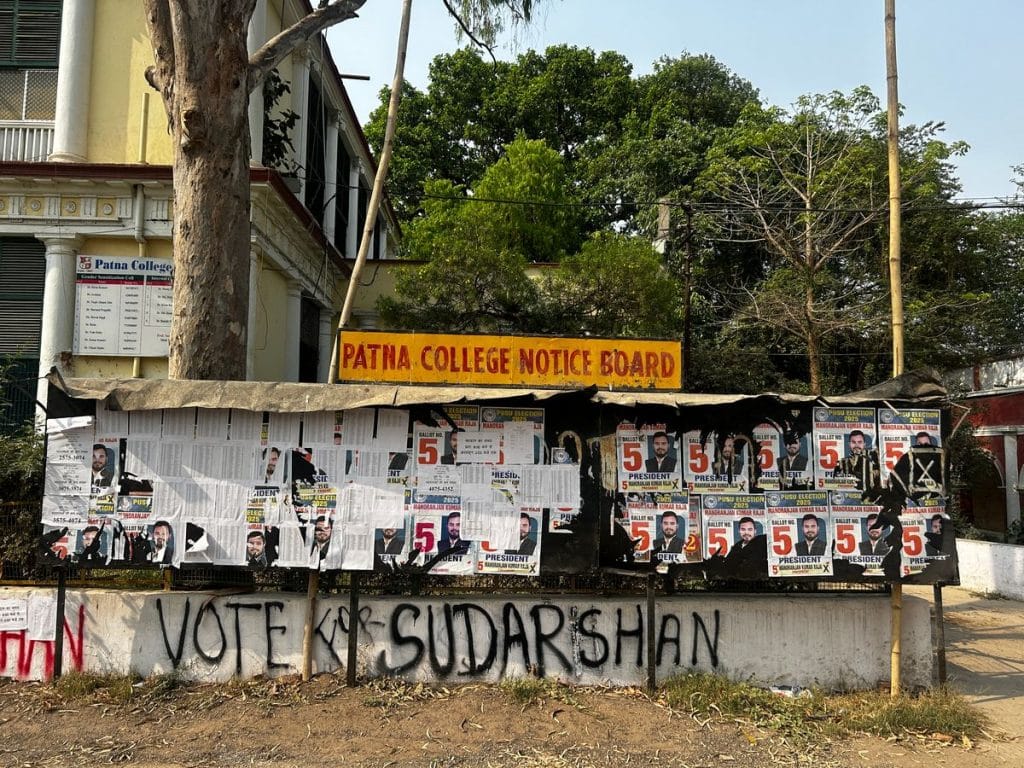
Student elections at Patna University reportedly began in 1959, when Shailesh Chandra Mishra became the first PUSU president. It peaked during the JP Movement—a student-led anti-corruption campaign in the 1970s. In the landmark 1973 elections, Lalu Prasad Yadav, Sushil Kumar Modi, and Ravi Shankar Prasad were all elected to the same panel. Ram Jatan Sinha, who later became a state minister and Congress’s Bihar president, also once held the top post.
But that golden age didn’t last. Elections were suspended during the Emergency and remained erratic until 1984. Then came a freeze that lasted almost 30 years.
“The campus politics here had turned violent, and caste wars raged; as a result, they were discontinued,” said Patna University dean Anil Kumar.
Back in the days when the likes of Lalu or Nitish were active, the percentage of women enrolled in the university was below 25 per cent. You’d often hear Nitish remark in his speeches that there were barely 7 or 8 girls in his engineering college
– Anil Kumar, Patna University dean
Polls were finally revived in 2012, with ABVP’s Ashish Sinha—now secretary of the BYJM—becoming president. After this, there was another five-year gap. When elections returned in 2017–18, independent candidate Divyanshu Bharadwaj won the presidency. In the following years, Mohit Prakash of Chhatra JDU and Manish Yadav of JAAP (Jan Adhikar Party-Loktantrik) were elected. Bharadwaj and Prakash now serve as JDU state secretaries, and Yadav is with the NSUI. The last elections were held in 2022.
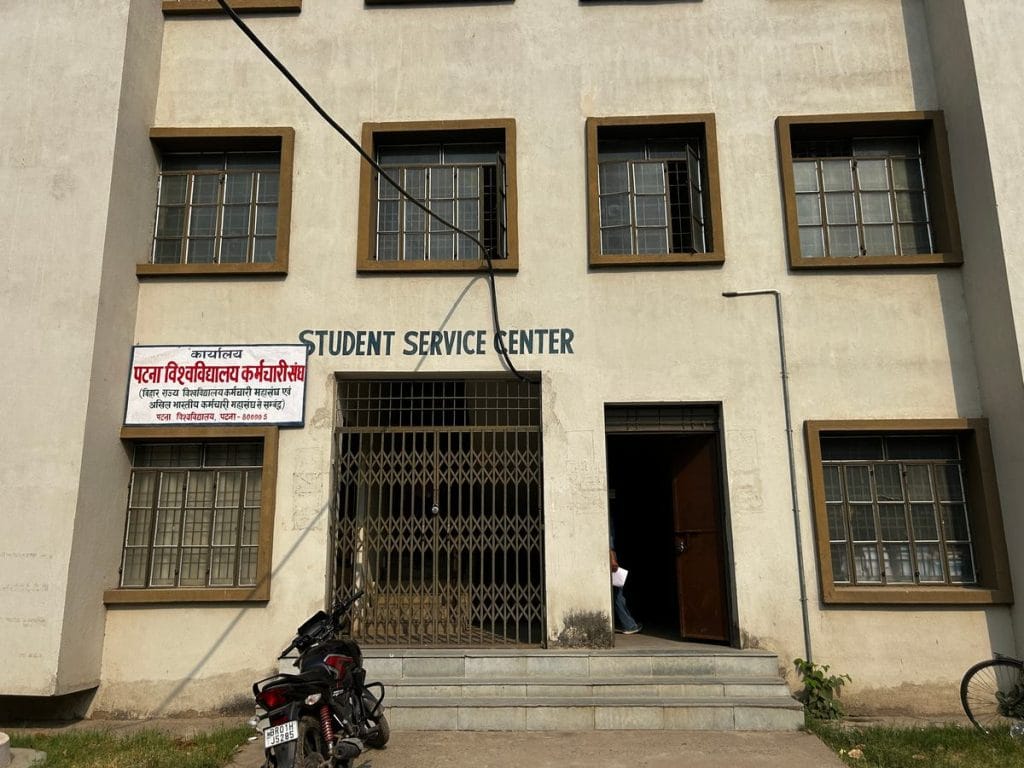
Today, PUSU isn’t regarded as the political nursery it once was.
“It’s not possible to recreate what the 1970s and 80s did,” said Anand Mohan, who was elected PUSU president in 2022 and is now a PhD candidate in management. “Today, one needs massive wealth or a dynasty to shine in mainstream politics. All (previous winners) have established careers elsewhere but are still holding positions within parties for connection.”
At present, 17,000 voters are registered for the elections at the university, but only 8,625 turned up to cast their votes. Dean Anil Kumar attributed the lower turnout to a “lack of interest” among students in campus politics lately.
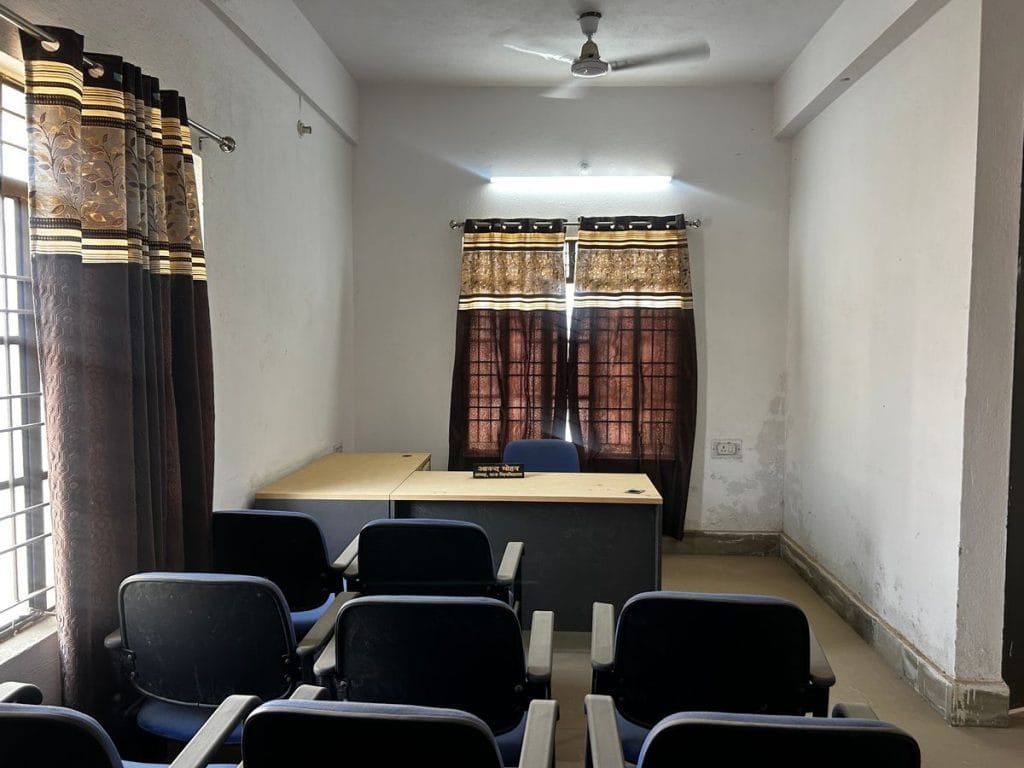
Still, the campaign was anything but lacklustre. Candidates from across the spectrum participated, except for Chhatra JD(U), which backed ABVP this time. Security was ramped up, statues of Ambedkar and Sardar Patel were garlanded, and the presidential debate drew a sizeable crowd. The energy on campus was palpable.
Overall, 114 candidates contested for 29 posts, including five key office bearer positions and 24 council member seats.
And the frontrunners were unlike ever before.
Out of the 30 candidates running for five key posts, 11 were women. Apart from the three women, Dheeraj Kumar, an independent, was elected vice president, and Rohan Kumar of NSUI became joint secretary.
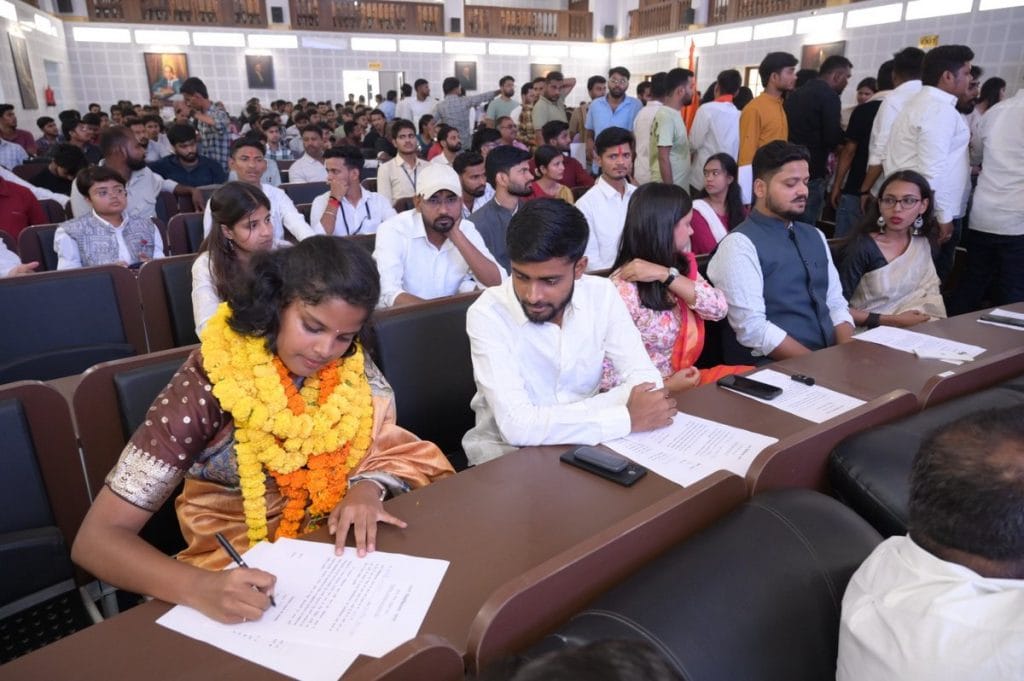
Until now, women have barely featured in PUSU elections, much less won them. The office still displays the 2022 panel in bold blue ink. Of them, only one stands out among the five names—joint secretary Sandhya Kumar of Chhatra JD(U).
“Back in the days when the likes of Lalu or Nitish were active, the percentage of women enrolled in the university was below 25 per cent,” said dean Kumar. “You’d often hear Nitish remark in his speeches that there were barely 7 or 8 girls in his engineering college. Over the last five years, we have 70 per cent girls enrolled in Patna University.”
For Maithily Mrinalini, though the past isn’t irrelevant. She said she was drawn to student politics because of the JP Andolan, a movement that had once turned Patna University into a rallying force.
“If I can fulfil even one of my many promises, it would be to revive the legacy of great poets and politicians, like Ramdhari Singh Dinkar and JP Narayan,” she added.
Also Read: DU’s Northeast students’ union fought prejudice with politics—now it’s pulling back at a price
No hostel, no oath
In her final speech before polling, Saloni Raj framed the election as a fight for girls who were still afraid to speak up.
“The way they tried to stop a lone girl is something you all know about. Still, that girl is fighting till her last breath. She fought for her rights and fought for all women,” she said, urging voters to pick female candidates.
“Yeh chunav nahin, chunauti hai (This is not an election, it’s a challenge). It’s for those girls who still can’t raise their voices.”
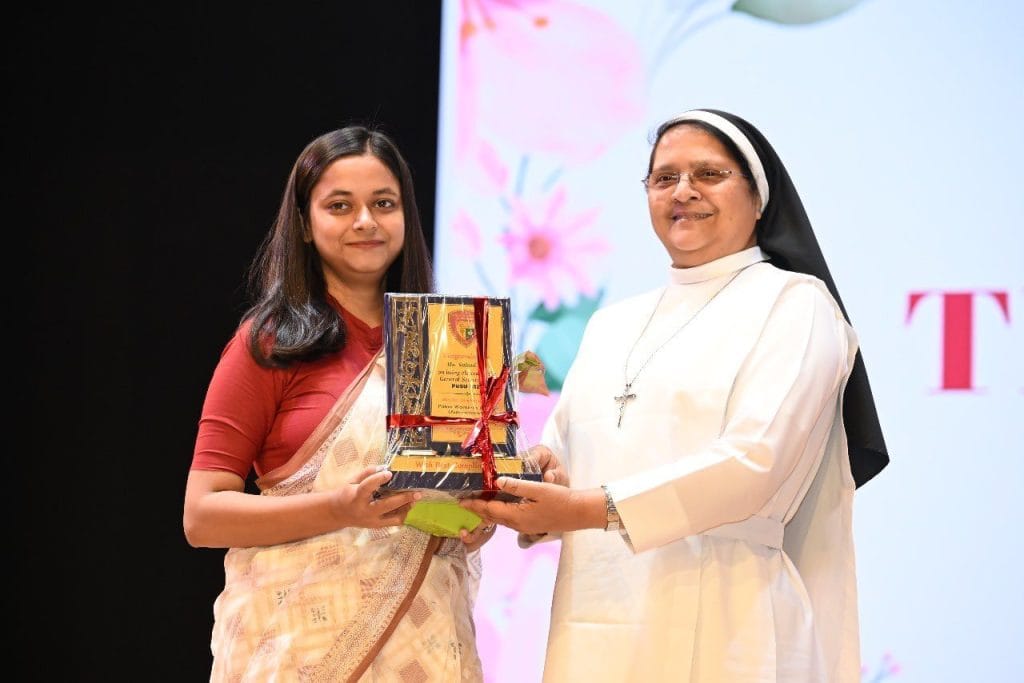
But after her victory, Raj seemed tired of the “woman winner” narrative.
“The last 30 or 40 interviews are all about women winning,” she said.
What is top priority to her is the continued closure of the boys’ hostels since the 2022 lynching incident. It was one of her main campaign causes.
“There was no student representation back then because elections hadn’t been held since 2022,” said Raj, a third-year Bachelor of Business Administration student who defeated the ABVP’s Ankit Kumar by over 2,300 votes. “Instead of the vice-chancellor or the dean stepping down, it was the students who were forced to leave their hostels.”
The daughter of a contractor from Patna, Raj says her win has made her consider a career in politics. She chose to run as an independent, she added, because she didn’t want to carry any party’s ideology and baggage.
“My ideology is beyond religious and caste lines. I believe in nationalism,” she said.
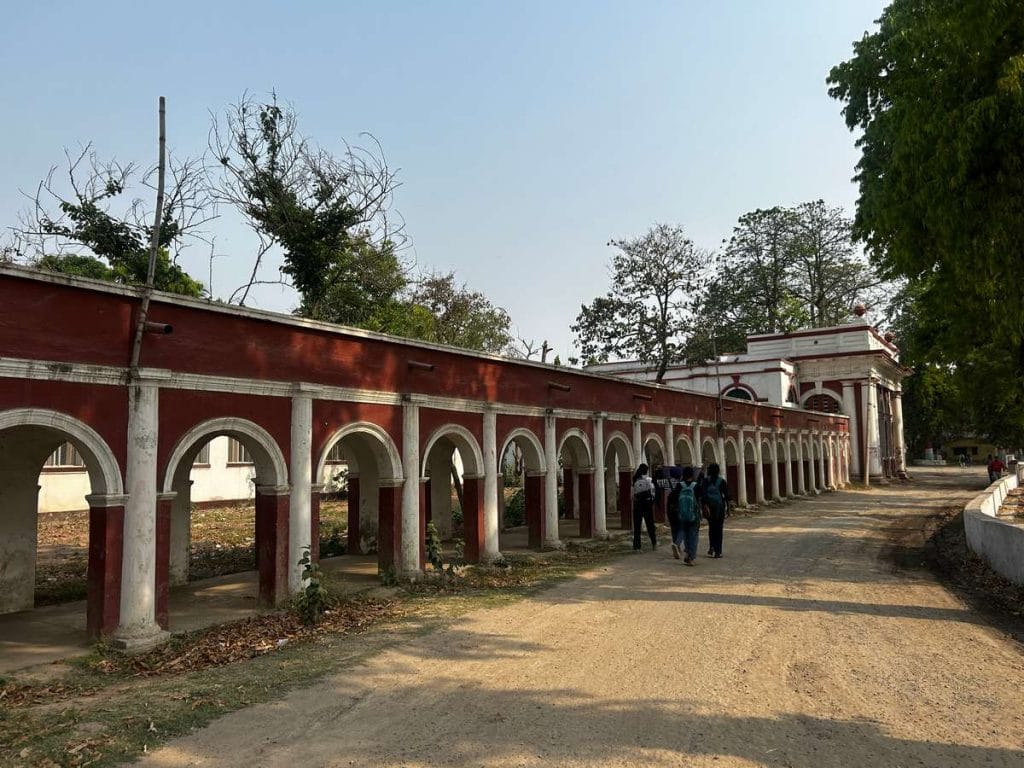
On this front, both she and Maithily Mrinalini have common ground, although for the new president, the ABVP was the right vehicle.
“It naturally felt like home to me in terms of nationalism,” said Mrinalini, who refers to the ABVP as her “parivar”. The third woman winner, Soumya Srivastava of the NSUI, has kept a lower profile. The geography student’s proposals include introducing digital libraries in all departments.
With both Mrinalini and Raj studying at Patna Women’s College, and Srivastava an alumna, Sister Marie Jessie, who served as its principal until 2018, said she was optimistic.
“We are witnessing some change, and I hope it’s for the good,” she said.
On the day of the oath ceremony itself, Saloni Raj made good on her promise to fight for one of her pet causes. As her name was called, she delivered a speech—but refused to take the oath until the hostels were functioning again.
“If I take the oath today, it would be an injustice to my brothers,” she said.
Dean Anil Kumar has warned that she will be disqualified if she fails to take the oath, but Raj told ThePrint she’s sticking to her guns.
So far, her stand has paid off. Her Instagram video from the ceremony crossed 34,700 likes and drew more than 300 comments, with many using the word “powerful” to describe her actions.
“I was really wanting this type of student leader,” wrote one user. Another rued: “I regret not voting for you.”
(Edited by Asavari Singh)



